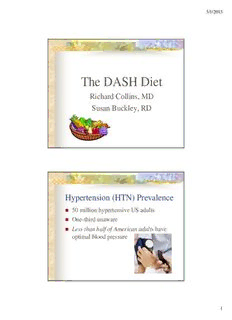
The DASH Diet - South Denver Cardiology PDF
Preview The DASH Diet - South Denver Cardiology
10/23/2014 The DASH Diet Richard Collins, MD The Cooking Cardiologist Susan Buckley, RD DASH Diet D: Dietary A: Approaches to S: Stop H: Hypertension (High Blood Pressure) 1 10/23/2014 Hypertension (HTN) Prevalence 50 million hypertensive US adults – about 1 in 4 adults One-third unaware Less than half of American adults have optimal blood pressure Hypertension As many as 2.8 million children also have high blood pressure. The prevalence of hypertension increases with age. 2 10/23/2014 Untreated hypertension can result in: Arteriosclerosis --Kidney damage Heart Attack --Stroke Enlarged heart --Blindness 3 10/23/2014 Hypertension – High Blood Pressure HTN means increased pressure in blood vessels: less space for blood to travel through 4 10/23/2014 Prevalence of Hypertension by Age Age % Hypertensive 18-29 4 30-39 11 40-49 21 50-59 44 60-69 54 70-79 64 80+ 65 5 10/23/2014 Hypertension When the normal regulatory mechanisms fail, hypertension develops. Hypertension is so dangerous because it gives off no warning signs or symptoms. The “silent” disease Factors Influencing the Development of Hypertension High-normal blood pressure Family history of hypertension African-American ancestry Lifestyle factors: overweight/inactivity/diet/sodium/ alcohol/smoking 6 10/23/2014 Factors Influencing the Development of Hypertension Excess Consumption of Salt Certain segments of the population are ‘salt sensitive’ because their blood pressure is greatly affected by salt consumption Salt vs Sodium Salt is sodium + chloride Both are minerals Salt is made up of 40% sodium and 60% chloride It's that 40% sodium that causes so much concern 7 10/23/2014 Sodium The 2010 Dietary Guidelines for Americans recommend limiting sodium to less than 2,300 mg per day. 1,500 mg if you know you suffer from high blood pressure, kidney disease, or diabetes. The average daily sodium intake for Americans aged 2 years and older is more than 3,400 milligrams (mg) Reducing average population sodium consumption by 400 mg has been projected by the Centers for Disease Control to prevent up to 28,000 deaths from any cause and save $7 billion in health care expenditures annually Who is Salt Sensitive? Experts disagree as to the exact definition and cause of salt sensitivity but the chief symptom is blood pressure that is unusually sensitive to salt or sodium intake. Salt sensitivity is especially common among older people, African-Americans, and people with hypertension, kidney disease or diabetes. Overall, 26% of Americans with normal blood pressure and 58% of those with hypertension are salt sensitive So far there's no easy way to test for salt sensitivity—or its absence (though researchers seem to be narrowing in on a "salt gene 8 10/23/2014 What about Iodine? Recent research suggests that iodine deficiency isn't as rare as it once was. Adults need 150 micrograms a day, which we used to get easily from our diet from iodized salt But in recent years, some of our main sources—restaurant and processed food—are lesslikely to contain iodized salt. We also get iodine from fish, shellfish, strawberries, yogurt, cow's milk, and eggs. Kelp contains the most, so sushi eaters get plenty. Blood Pressure and Minerals But it's not enough to just lower sodium. Too much sodium really does boost blood pressure, but high blood pressure really responds when you restore the natural mineral balance your body needs for healthy BP regulation. The perfect mineral ratio: 1,500 - 2,300 milligrams of sodium 4,700 milligrams of potassium, 1,200 milligrams of calcium 420 milligrams of magnesium. 9 10/23/2014 Mineral Intake and Hypertension Calcium American Heart Association Statement: Increasing calcium intake may preferentially lower blood pressure in salt-sensitive people Benefits more evident with low initial calcium intakes (300-600 mg/day) Percentage Meeting 100% of AI for Calcium Calcium Intake % of AI 100.0% 90.0% 80.0% 70.0% 60.0% 50.0% 40.0% 30.0% 20.0% 10.0% 0.0% Under 1 1 to 2 3 to 5 5 and under6 to 11 12 to 19 20 to 29 30 to 39 40 to 49 50 to 59 60 to 69 70 and over20 and over Males and Females Males Females . 10
Description: